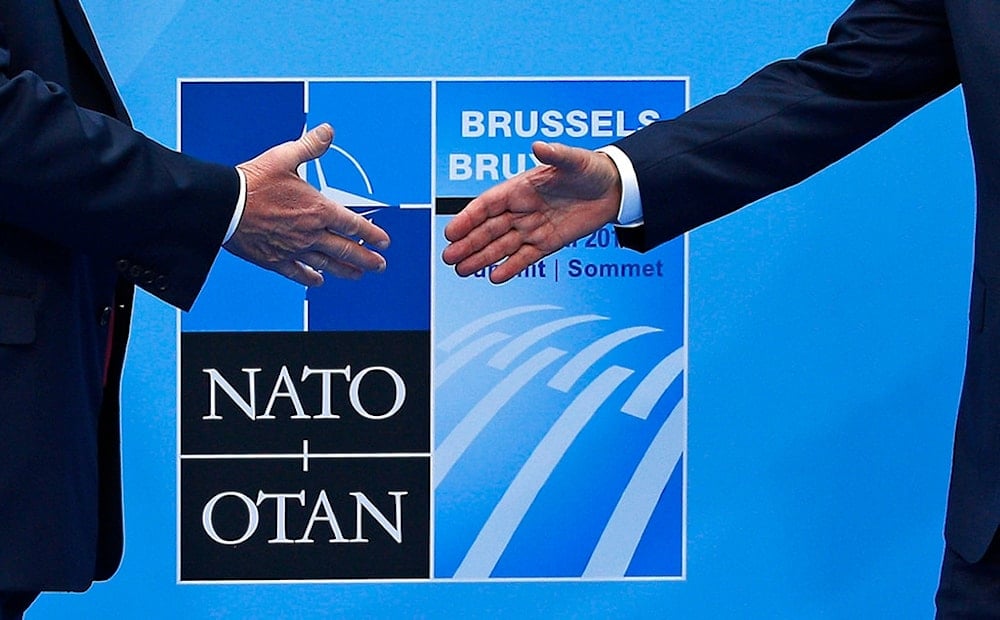NATO re-evaluating long-standing Russia strategy: Politico
NATO's "Founding Act" with Russia, which aims for stability and unity in the region, no longer applies to the current circumstances, prompting a change in policy.
-

Former President Donald Trump, left, is greeted by former NATO Secretary General Jens Stoltenberg before a summit of heads of state and government at NATO headquarters in Brussels on Wednesday, July 11, 2018 (AP)
NATO defense ministers are expected to meet next week to re-evaluate their long-standing strategy regarding Russia, a report by Politico revealed.
This is due to the "Founding Act" between Moscow and the US-led military block, which is still in effect and binding, despite ties between both parties falling off following the onset of the Russian-Ukrainian war in 2022.
According to Politico, the 1997 document, which declares that NATO and Russia aim to "create a stable, peaceful, and undivided Europe," no longer represents the present circumstances.
In July, NATO labeled Russia as the alliance and Europe's "most significant and direct threat to Allies’ security," while Russia asserted that the military alliance's expansionist policy constitutes an "existential danger" for its sovereignty and territory.
However, a senior US official was quoted as saying that NATO is trying to "map out different elements of [the Russia] strategy and advance the debates inside the alliance that takes us to subjects like the future of the NATO-Russia Founding Act."
Discussions about the new Russia policy have been taking place at lower levels within the bloc for several months, and the topic will be discussed at the ministerial level next week, according to the report. NATO has indicated that it intends to develop a new strategy ahead of its summit in The Hague scheduled for next summer.
"Right now we have to have an understanding across the alliance... that the [Founding Act] and the NATO-Russia Council were built for a different era, and I think the allies are prepared to say that was a different era in our relationship with Russia, and therefore something new is merited," the official added.
He described the strategy as primarily a "political exercise" with anticipated "limited" military implications. According to Politico, NATO members have differing views on the new policy towards Moscow; some worry that too aggressive an approach could destabilize Russia, while Hungary and Slovakia, despite being NATO members, see value in maintaining engagement with Moscow.
NATO leading provocations: Russia
Earlier this week, Russian Deputy Foreign Minister Aleksandr Grushko stated that NATO is openly preparing for a potential military conflict with Moscow. He noted that the bloc is continuously developing various strategies for engaging with Russia, increasing military budgets among member states, and militarizing Western economies.
Grushko asserted that it is NATO, not Russia, that has chosen "the path of confrontation" by rejecting engaging in diplomatic dialogue. He claimed that, as a result, the US-led bloc is fully responsible for the "major European security crisis" stemming from the Ukraine conflict.
Last month, following an annual NATO Military Committee Conference in Prague, Military Committee Chair Adm. Rob Bauer stated that, from a military perspective, he believes it is "justified" to allow Ukraine to target Russia with long-range missiles provided by the West.
"In accordance with the law of armed conflict, every nation that is attacked has the right to defend itself, and that right does not stop at the border of your own nation," Bauer said.
He further explained that, from a military standpoint, there are compelling reasons for Kiev to strike, such as disrupting Russia's logistics, fuel, and ammunition supplies at the front lines, thereby weakening its enemy.
These remarks come as US President Joe Biden and UK Prime Minister Keir Starmer were set to meet in Washington to discuss the possibility of allowing Kiev to use Western-provided long-range missiles to target Russian positions. The move has raised tensions with Moscow, with Russian President Vladimir Putin warning that such action could be seen as NATO entering into direct conflict with Russia.

 4 Min Read
4 Min Read









